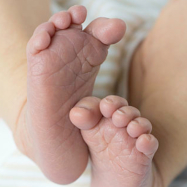Health Data Exchange Assists in Newborn Screening Programs
Secure messaging is part of technology upgrades as states speed up treatment of babies born with rare but serious conditions.

- The field of newborn screening (NBS) will get a boost from health data exchange upgrades in several states, thanks to $5.4 million in funding from the Health Resources and Services Administration (HRSA). The Colorado School of Public Health and the Association of Public Health Laboratories (APHL) will use grant money to expand the infrastructure of NewSTEPS 360, which provides data, technical assistance and training to NBS programs across the country and helps individual states with quality improvement initiatives.

An estimated 4 million newborns are screened annually nationwide for genetic, metabolic, heart and hearing conditions. NewSTEPS aims to the improve timeliness of NBS programs, thereby speeding up treatment of babies born with rare but serious conditions.
“Newborn screening remains one of the most successful public health programs in the United States,” said Marci Sontag, PHD, director of NewsSTEPS 360 and associate professor of epidemiology at the Colorado School of Public Health, in a prepared statement.
The school and APHL announced on Feb. 16 the selection of 20 states/territory that will comprise the initial cohort of the HRSA grant. Here’s a sampling of technology-related aspects of NBS programs among participants:
- Hawaii will train providers to use a web-based data system to review newborn screening results. The state will also partner with four large birthing facilities to enable electronic order entry and reporting of newborn screening results using HL7 messaging.
- Michigan will use electronic messaging with up to eight hospitals to develop demographic submission and results reporting to/from the state laboratory, and to verify receipt of blood samples by the lab.
- Minnesota will facilitate data transfer from hospitals to the laboratory by capturing demographic information from the electronic health record.
- Nebraska will broaden existing health IT efforts by including more hospitals in the state initiative. This will enable participating hospitals to receive demographic data and report results via HL7 messaging.
- Puerto Rico will develop an information tracking system to reduce the time of reporting results.
- Texas will partner with birthing facilities and providers to promote rural demographic data entry through a web application.
- Virginia will work with hospitals to establish standards-based electronic order submission messaging. The state will also create tools and guidelines to help pave the way for continued NBS implementation in other hospitals and states.
- Wisconsin will develop a system for the electronic submission of demographic information requested on blood specimen cards. The state will also establish HL7-based data exchange of test orders and results between hospitals and the screening laboratory.
Over the next three years, NewSTEPS 360 will provide additional financial and technical help to participating NBS programs.
"We can really shift the field of newborn screening with this project because the NewSTEPs 360 partnerships combined with innovative approaches from state newborn screening programs will provide a catalyst for powerful quality improvement in newborn screening,” said Sontag.
Jelili Ojodu, MPH, director of the newborn screening and genetics program at APHL and program director for NewSTEPS, added, "Our top priority is to partner with state public health departments to strengthen their newborn screening programs and provide the best services for the babies. For many of these disorders, an hour or two can make the difference in changing an outcome for a newborn.”
